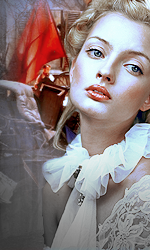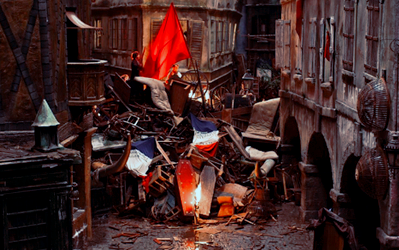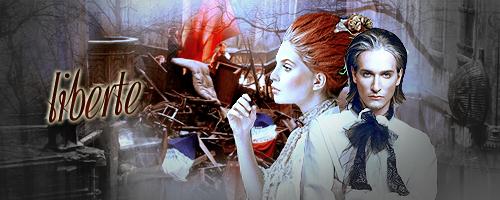Post by FRÈRE NICÉPHORE on Apr 3, 2013 5:44:35 GMT -5
[atrb=border,0,true][atrb=style, background-color: f9f9f9; border: #1f4579 solid 10px; width: 420px; padding: 15 5 15 5px;] At the end of the day you're another day colder FULL NAME: Frère Nicéphore Lamarque NICKNAMES: Mr. Nice-Guy, Frère Pardon, Lunaire HERITAGE: French AGE: 35 GROUP: Clergy CANON: nope PLAYBY: Mathis Landwehr ----- PERSONALITY: When dealing with Nicéphore, you would probably constantly be torn between annoyance, amusement and disbelief. He is definitely too good for this world, and while he wants everyone to be happy and peaceful, he is hopelessly naïve, seeing the good in everyone and being firmly convinced that every evil in this world is simply a misunderstanding that can be put right by talking it through. Even at a young age, he was a dreamer, a lunatic even some might say, and he completely disregards violence. If the world would only listen to his neverending sermons of forgiveness and love, he is sure every conflict could be solved on the spot. Steeped in the firm belief and confidence of being God’s divine instrument of bringing harmony and peace to this world, he follows the example of the founder of his order, St. Francis, but without his radical rejection of things. He is understanding of everything, he solely wants to be an instrument of God’s neverending peace and the ‘Prayer of St. Francis’ is always on his lips, his perpetual credo. Tirelessly, he strives to bring peace and salvation to every soul in Paris, even to those that might not even ask for it. He is seen on the streets almost every day, making his rounds of distributing goods and staying for confessions and encouraging words, but he would never tell anyone to take up arms and fight, since that can never be a solution to anything. His strong belief also makes him immune to fear, and his naivety only adds to his recklessness. If someone were to strike him down, he would get up and forgive the man, smiling his ever-present lenient smile. Often his eyes seem to be far away in a world only he can see, which earned him the reputation of a hopeless dreamer. Yes, he does dream about a world where everyone is equal, but he thinks it is God’s decision when he will bring His kingdom about, and he is sure that only the abdication of violence altogether is the key for the human race to come anywhere near to this point. APPEARANCE: Nicéphore could be roughly described as a big baby. He is tall and has broad shoulders, an excellent physique of a fighter, just that he never wanted to be one. His hands are big and made for applying strength, but his total lack of willingness to use them for any force other than carrying goods into the slums Saint-Michel makes him appear clumsy and out of his element. His eyes are of a pale green and glitter with a faraway look most of the time, as if the peaceful, dreamy light of otherwordliness shone through them. His hair is of a sandy blond and even though his tonsure is always neatly cropped, the rest of his hair appears to rather unkempt and scrawny, since he is not in the least bit to be called vain and his short beard is equally messy, making him look a little older than his actual age. He doesn’t even possess a mirror, following commands of poverty wherever he can. The brown habit of the Franciscan monks is his perpetual attire, held together by the white rope with three knots in it to symbolize his vows of poverty, chastity and obedience. Worn out, simple sandals complete his plain attire. GOALS: He has no high ambitions for himself, he just wants to be listened to as an instrument of God and his ultimate goal for the world is for it to live in peace and harmony together, following the laws of God, sharing wealth equally and abdicting violence altogether. He wishes the ‘Garden of the Lord’ to come in his time, he wishes to see that swords get turned into ploughshares for real, and he wants to be a voice heard and observed by any class. HISTORY: For as long as Nicephore can remember, he felt like being born into the wrong household, to the wrong father, to the wrong life even. It didn’t fill him with dread, just a mild letdown, as he just couldn’t seem to do what was expected of him. His father had been a renowned General under Napoleon, a war hero, and now he was a politician, a powerful member of the parliament, always referred to as ‘General Lamarque’. But Nicephore was neither interested in politics, nor could he be convinced to show more than cursory and dutiful enthusiasm in warfare. His tutors, the best his father could pay, gave up one by one, and he was sent from a fighting accademy in disgrace after he had challenged the master at arms to a debate on the use of weaponry in favour of discussion and communication. He devoured books, but they were not compendia on warfare, but consisting of poetry and hagiographical stories. His father, Jean Maximilian Lamarque, was by no means willing to give up on his failure of a son and leniently endured the taunts and jeers he was given on his behalf, when other generals and politicians boasted with the prowess of their sons and heirs. But the only time he could seem to get through to Nicephore was when he talked about the people of the lower classes and how he wished to see them fed and cared for. This was a strife the young man could understand, and he often went out into the streets to see for himself what his father was referring to. But while his father was a man of fighting and always would be, the son soon began to develop a downright aversion against even the mildest form of violence, given in a hit or even so much as a threat. And yet, when the time came for Napoleon’s return in what would later be called the Hundred Days, and every man was needed for the battles the former emperor wished to fight to reestablish his position of power, Nicephore was sent to the front against his will. He was forced to see horrors beyond his imagination and yet could not flee as an old friend of his father’s kept a close eye on him. Only in the final chaos of the battle of Waterloo when the troops disintegrated, he was able to turn and flee – desert in the eyes of many. He returned home in disgrace, having fled before the official retreat had even been sounded, and only by an almost to be called divine intervention he escaped to be put on trial: firstly for serving Napoleon, and secondly for deserting. While fleeing the violence, Nicephore had vowed to take the cloth if he should come out of this alive, and he joined the Franciscan Order of Paris as soon as he returned. It was here where he finally found his true vocation. While his father had to stay in Belgium exile for three years, Nicéphore resigned to a life of work and prayer, feeling like he could not possibly belong anywhere better. The saint Francis had always seemed like a perfect role model for what he would strive to be: an advocate of peace and love, helping those who needed him most without preaching violent change. Nicéphore wanted to be a servant of the lowest, not a leader. The only true leader was God, and He would bring the necessary changes in His own good time. He was deeply convinced that if people only repented their sins, everyone would find forgiveness, even those who had lived a life of utmost violence and greed. Venturing there were even his fellow brethren shied away from, he heard the confessions of those who did not dare to look to a priest, in the lowest slums of Saint Michel and in the Cour de Miracles, and he always forgave. Those who did not come to him, he tried to seek out and convince to change their ways, even though he wasn’t always heard and often laughed at, adorned with nicknames like Frère Pardon and Lunaire. It took years for his father to finally accept the separate way his only son had taken, and they stayed more or less estranged, even though concessions and a will to reconciliation could be seen in the way Lamarque doubled his efforts to give the poor people a voice in parliament and in the ears of those with power. When the cholera epidemic came down on Paris, father and son started to work hand in hand, the one by directly going to the suffering and treating them, the other by trying to fight the cause, not the effect. By some twist of fate, or as Nicéphore was certain divine will, the monk never fell under the curse of the illness himself, but his father was not so lucky. The general’s age made him an easy prey for the virus and slowly he wasted away. On his deathbed, father and son finally reconciled fully, but they both did not foresee the events his death would cause. Paris had become a powderkeg of boiling emotions and discontent, and as much as Nicéphore still tried to bring peace and love to those that needed it most, he more and more heard words of anger and talk of a needed uprising in the streets. He had tried his best to appease them, telling them that violence never was the key, but he felt even more helpless when it came to the men he once had been forced to be a part of: soldiers. He knew first hand how despisingly trigger-happy they were, after all. As much as he despises conflict, in the upcoming one this monk will find himself between all positions. He will try to continue his father’s work in his own way, but he will never ever stand for violence in his name. ----- ALIAS: Gwen AGE: 25 GENDER: female OTHER CHARACTERS: Mylène, Lucien HOW DID YOU FIND US: Slayeeeeeeeeerette! ROLEPLAY SAMPLE: by now ye should know how I write  And the shirt on your back doesn't keep out the chill |




